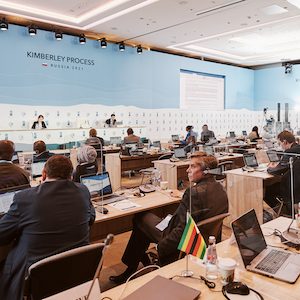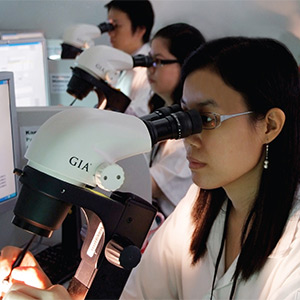
Belarus, the country known for its fealty to Russian president Vladimir Putin and terrible human rights record, has asked to be approved as the 2023 Kimberley Process (KP) vice chair, according to documents seen by JCK.
The vice chair is the traditional stepping stone to becoming the chair of the certification scheme, which aims to stop conflict diamonds from reaching world markets. If Belarus becomes the vice chair in 2023, it will be first in line to become the KP chair in 2024.
“[The] Republic of Belarus is prepared to take up this important role to uphold [the] KP family’s unity and authority to support the global diamond industry,” said a letter signed by Belarus KP focal point Ivan G. Stepanenko and deputy minister of finance Vladislav Tatarinovich.
It’s hard to know what to make of Belarus’ bid, which will likely be opposed by the United States, which currently has sanctions in place against the country and its ruler. (The KP requires absolute consensus among its 56 participants, which represent 82 countries.) Belarus must know that as long as Russia remains in Ukraine, it does not have much of a chance of becoming chair, making this bid feel almost like a troll. Belarus is also not considered a major player in the industry. It is not a diamond producer, though KP statistics make it seem like a transfer point for Russian diamonds.
The other candidate for 2023 vice chair—the United Arab Emirates (UAE)—may also prove controversial.
“The role of the chair requires deep expertise and experience,” said a letter from Ahmed Bin Sulayem, executive chairman and CEO of the Dubai Multi Commodities Centre. “Having chaired the KP previously, and as the leading global hub for rough diamonds, the UAE stands ready to take this responsibility immediately.”
Bin Sulayem and the UAE chaired the KP for a roller-coaster year in 2016, which caused the KP Civil Society Coalition (KPCSC) to boycott that year’s meetings.
The UAE has long been the target of criticism from nongovernmental organizations, and it has often lashed back at them.
The diamond systems in its main financial hub, Dubai, have long been criticized, though some say the country has made efforts to improve things after it was placed on the Financial Action Task Force (FATF) “gray list” last year. Though few statistics exist, anecdotal reports say that it has largely stayed clear of Russian rough, which has mostly gone to Belgium and India.
But UAE critics complain that issues remain with “transfer pricing” and a general lack of transparency.
All of which puts reform-minded countries, including the United States, in a bind. The Western reform contingent is a small but important group, and has not put up a candidate for KP vice chair. Given that U.S. and European Union representatives have boycotted KP meetings chaired by Russia since its invasion of Ukraine, it’s possible that any candidacy from that bloc will also get a veto. Moreover, Western reps may not want to head the scheme at a time when they strongly disagree with its inaction regarding Russia.
In 2023, Zimbabwe will take over the certification scheme as chair. So far, that has been a surprisingly non-controversial choice, at least inside the KP. But 2024 is looking far more dicey.
Top: A Kimberley Process meeting (image courtesy of the Kimberley Process)
- Subscribe to the JCK News Daily
- Subscribe to the JCK Special Report
- Follow JCK on Instagram: @jckmagazine
- Follow JCK on X: @jckmagazine
- Follow JCK on Facebook: @jckmagazine







